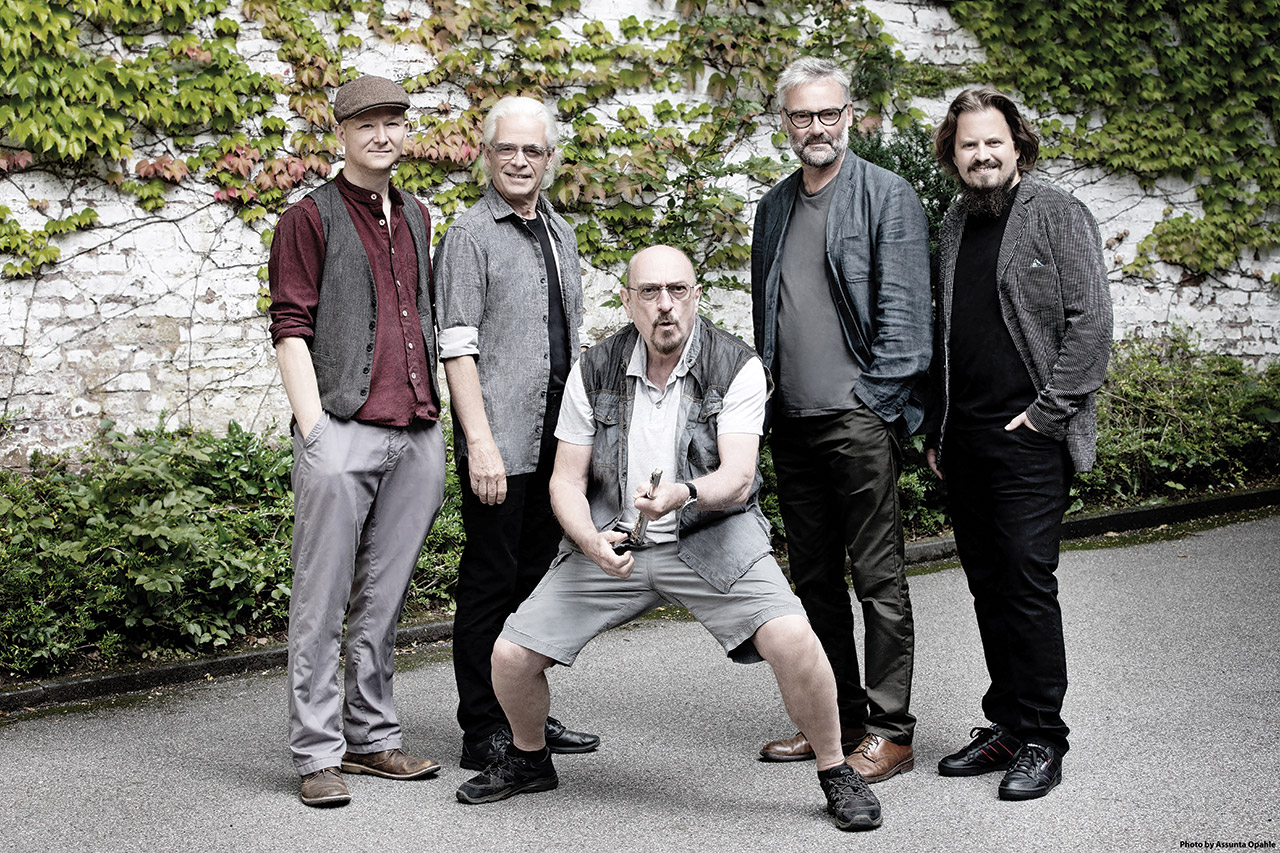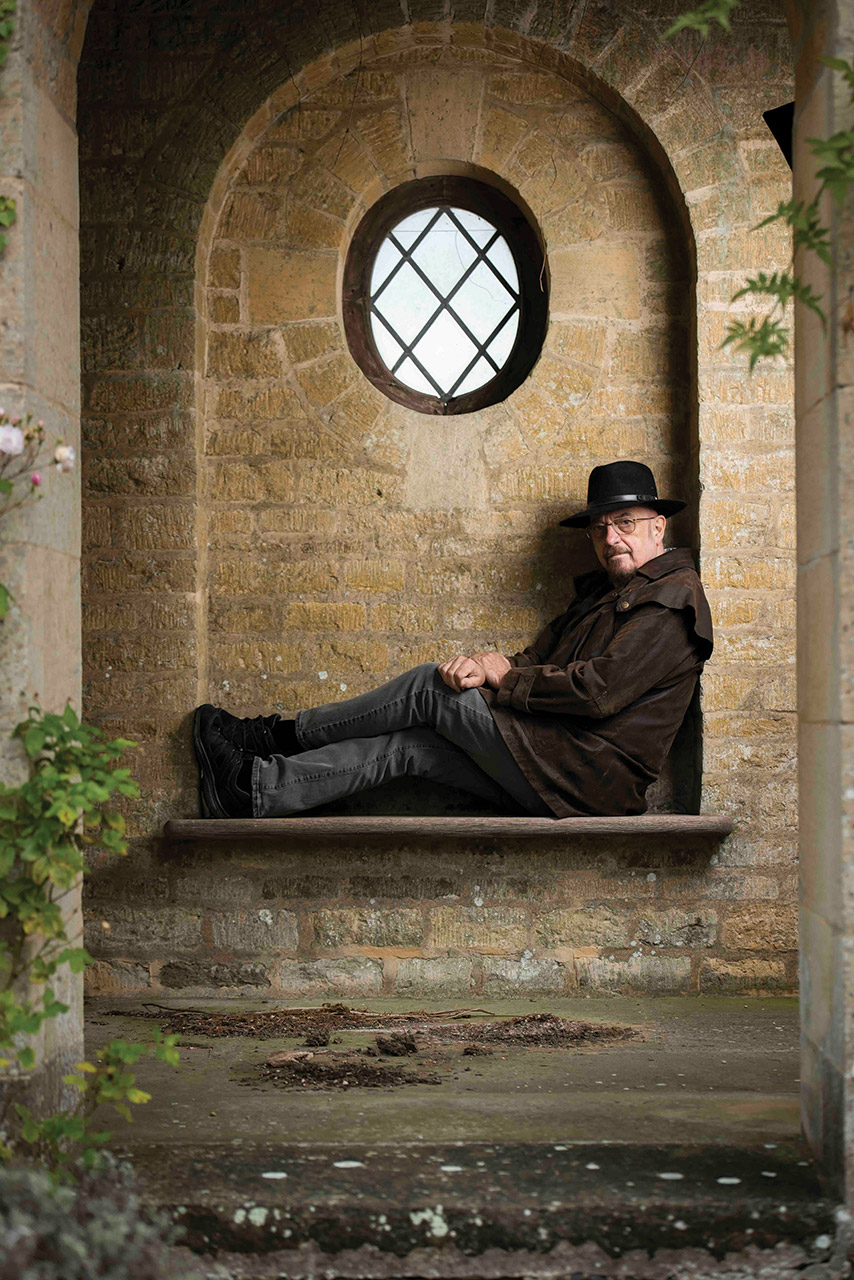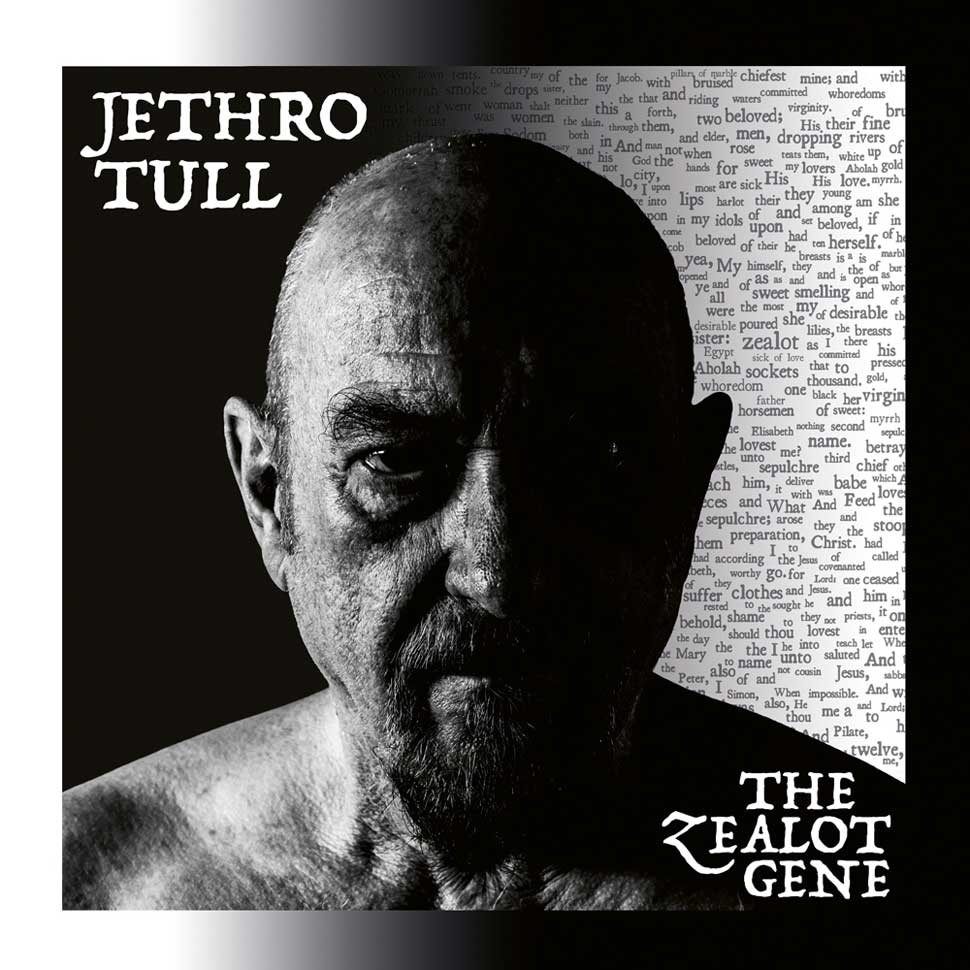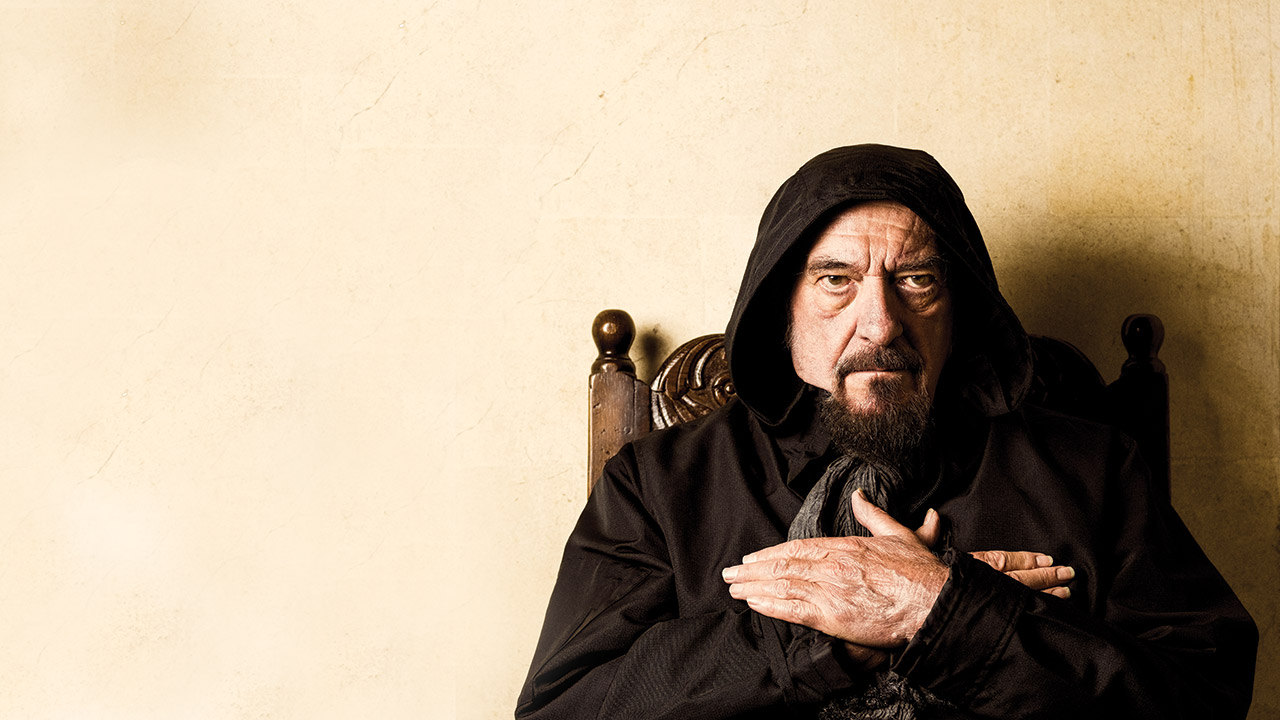Ian Anderson is not messing about. A few months ago Prog asked the man synonymous with Jethro Tull about the challenges of post-Covid touring, and when he said, “I expect to be wearing a mask for the rest of my professional life,” he didn’t just mean any old mask.
“I wear none of that namby-pamby flimsy blue stuff,” he tells Prog. “People think it’s sufficient for the job and it’s as useless as a face covering. I wear an FFP2 mask or sometimes an FFP3 mask, because I care about my health and indeed the health of others. I wear a five-layer mask and have done all the time [since the pandemic began], but then they are more difficult to breathe through, especially with any physical exertion going on.”
However robust the protection adopted, though, you would have been forgiven for wondering if Anderson – a man who last year revealed that he was diagnosed in 2018 with COPD (Chronic Obstructive Pulmonary Disease), causing breathing difficulties even before the pandemic hit – might step back from Tull activities, above all live ones, at this point.
Not likely. Because this is a man still determined to continue working as long as he is physically and mentally able, to the point where he might conceivably “die with his boots on”, as he will tell us later. And maybe it’s that indefatigable creative drive that has helped make the new Jethro Tull album their best for many a year.
The release of The Zealot Gene is one reason why the workload for Jethro Tull is about to ramp up once again in earnest after the enforced performance hiatus. And with the ink barely dry on a Tull lyric book and a deluxe reissue of Benefit having found its way into plenty of fans’ stockings last month, Ian Anderson is as busy as ever.
And if you’re worried about what sounds like a distinctly scary medical condition, he somewhat downplays the seriousness of the situation to Prog. He insists he is simply managing something similar to the asthma he has suffered from since he was young. As he put it more eloquently in a press release last year, the condition has “no impact at all on my daily life as long as I don’t catch a cold or flu virus [he of course adds Covid to that danger list] and suffer the subsequent heavy bronchitis which, for me, historically follows since I was a young man. But on the upside, I don’t suffer from haemorrhoids or erectile dysfunction. So, things are looking up, not down. (Puns fully intended.)”

Well, that’s a relief for all concerned. Still, it can’t be easy for a man of 74 to go on stage night after night, singing and playing the flute and, while not being quite as hyperactive as he once was, still putting in a fair old shift of physical activity. “I test myself every day using a peak flow meter to see what my lung capacity is doing,” he says. “But playing the flute and singing is a bit of a double whammy if you have my condition. The reality is that I do much prefer to keep performing, and if I’m not performing I regularly play the flute and sing and practise, just because I think that’s the best way to stay in shape.”
And whatever his physical situation, he seems in pretty fine fettle creatively and intellectually. The Zealot Gene comes packed with the stuff that characterised some of Tull’s finest long players: memorable riffs and instrumental hooks, embedded within beguiling song structures, to underpin waspish social comment and intriguing tall tales. The two things that make a record so instantly Tull in character – that voice and that flute – are as characterful as ever.
The band’s third album, 1970’s Benefit, was reissued in November, and your correspondent ended up listening to that album around the same time as The Zealot Gene. Anderson has often remarked on how riff-based Benefit was, and the same could be said of the new record.
Throughout, it retains your attention and reels you in with neat little musical figures and motifs, whether it’s the hopscotching flute hook on recent single Shoshanna Sleeping, a harmonica tune on Jacob’s Lament, penny whistle melody on Sad City Sisters, the haunting piano and plaintive backing vocal of Mine Is The Mountain, or the pounding power chords of the title track.

Is that how the Tull creative process tends to take shape these days? Grab a musical morsel and run with it?
“Well, it varies,” says Anderson. “But it’s pretty tried and trusted, isn’t it?
I mean, Beethoven, I suppose, led the way, didn’t he? Is it four notes in the Fifth Symphony? And they were basically versions of the same two, really. I wonder how that came about? I can imagine him sitting in his private writing room, hunched over a piano feeling frustrated, trying to find inspiration, and then suddenly somebody knocks on the door and he slams his hands on the keyboard in frustration. Dah-dah-dah-duuuuhhhh! And there’s the opening.
“Sometimes it’s that easy, and then sometimes it’s laborious – you have lots of little half ideas that you kick around for a day or two, or a week or three. Eventually something comes out of it, but it often starts from a little musical line. And it can often be the most memorable feature of a song.
“It certainly worked for Jack Bruce and Pete Brown when they wrote Sunshine Of Your Love, but only really once they had a lyric too. Jack had a riff – bom bom bom bom… bom bom bomp ba-bom-bom… – but that’s all that’s all they had. And they were getting absolutely nowhere, working all night with it. Pete Brown got up and went to the window and he notices… that it’s getting near dawn. A few minutes later, they had one of Cream’s most famous and successful songs. So sometimes it is just based on a little idea that can also be a lyric.”
Funny he should mention that given that he has recently published Silent Singing, a book of collected lyrics, and since The Zealot Gene has another hallmark of the best Tull albums, in that its lyrics are often as intriguing as the sounds.

The Zealot Gene is hardly a concept album as such, but there is a strong theme running throughout, and it’s a familiar one for seasoned Tull fans. The use of biblical language and reference points continues throughout, from nodding towards the story of Lot’s wife making the fateful decision to look back on an apocalyptic scene
in Mrs Tibbets, to The Betrayal Of Joshua Kynde and In Brief Visitation, in which he relates Jesus’ persecution to modern society’s constant need to find fall guys for their/our sins.
On a press release and lyric sheet sent out to the media ahead of this album’s release, Anderson preceded each song with a citation from the Bible – further reading, you might suggest. At Christmas he was (at the time of writing) set to perform another clutch of now-regular seasonal Tull shows in churches and cathedrals. Yet he continues to entertain a complicated, conflicted fascination with Christianity and the good book. A similar one, in fact, to that displayed when he penned My God on Aqualung, venting his disillusionment with organised religion. He’s admitted to seeing new track Mine Is The Mountain as a counterpart to that 1971 classic.
“I grew up having obligatory attendances at church, which I was quite fearful of,” he admits. “I didn’t enjoy the experience of being in a church. To me it just had a whole lot of connotations that I found unpleasant and I was fearful of the teaching because it seemed authoritarian, at least at my schools. It seemed to be somehow making excuses for very unpleasant things that were contained in the Bible. Things that were written by many, many authors and translated many, many times perhaps two or 3,000 years ago.
“But I began to feel differently about Christianity perhaps 20 years ago. I felt more at home being in churches, and going into churches and cathedrals in different parts of the world – occasionally doing temples and other religious buildings. So I found a place for me in that physical context of religion, and in that sense I have become a hands-on ‘supporter’ of Christianity I suppose. I’m playing shows in English cathedrals and the Vatican. A Christmas concert in Rome. But I do not call myself a Christian because I do not possess the vital attributes – in short, having faith.
“To me, faith implies certainty. I don’t do certainties, I do probabilities, and I do possibilities. I’m not in a rush to make up my mind, if indeed I have to, about anything. I like the idea of being able to sit on the fence. It really is the best place to be, you know, because from the fence you get a good view, you can see both sides, and have a good think about it.
“Most of it [the Bible], most of the time is a positive message, particularly part two [the New Testament]. And it isn’t a fairy tale, it is almost certainly based upon a real person, Jesus of Nazareth. But Jesus Christ, as the manifestation of God here on Earth in human form… I’m not very comfortable with that idea. But that doesn’t make me feel in any way that I have to sneer at other people’s beliefs or indeed sneer at Christianity, which I’m a big supporter of simply because of the positive side of it.”

It seems fair to say that Christianity helps Anderson position his moral compass, something that is clearly evident at several junctures on the new record, particularly when making some of the more topical comments therein.
The title track, for instance, points at a seemingly innate attraction for humans towards extremism and simplistic rhetoric, evidence of which has been seen here and abroad in various guises in the last few years, fuelled in no small part by social media discourse where the binary debate always seems to rise highest in the trending charts.
‘The black and white, the stereotype, the polarising pitch at play,’ goes the lyric. ‘While some of us sit in-between, interminable shades of grey.’ Anderson explains the thinking behind the song further: “It was inspired partly by the growth of right-wing populism and how extremist views seem to spread more freely and everything gets more exaggerated – sometimes through news stories, and some from ferocious tweets from, for instance, Donald Trump. People might tend to think that The Zealot Gene is specifically about Trump, and he certainly would figure in a list of characters who would have been floating around in my head, but it’s not specifically about him or people like him. It’s more about that need to have ‘a bee buzzing in your bonnet and a wasp right up the bum’, as I put it in the song.
“People just seem to have this need to get crazy about something. Maybe they’re just so easily bored with everything else and then they’ve got to work themselves into a fury. People in the past might have had a few crossed words over a pint in the local pub, but that face-to-face example of real people having differences of opinions, it seemed in that context, it was a little more harmless. Compare that to the midnight outpouring on Twitter or something, when people may well say things with a few drinks inside them, and in that environment, it can become something much bigger – all the vile, pent-up fury explodes into something that the world ends up reading about the next morning, and which might well end up as a permanent entry in your Wikipedia page.”
He has also seen the effects of heightened polarisation in people he’s come into contact with personally. The oft-mentioned factor of anonymity – which is often cited as being an enabling factor in the spread of online hate – doesn’t always feature.
“I remember having this discussion with two young Israeli students, from a college I was donating money to, which was promoting co-education of Arab, Christian and Jewish children, particularly in the arts. At the time the temperature was rising [in the Occupied Territories] and when I asked them about it they said there’s some people who just say really terrible things on social media, and the worst thing is you very often know who they are. And you see them every day; they’re sitting on the other side of the classroom. They said people just take on this other terrible personality on social media.
“I asked how they dealt with it and one said, ‘Well, we’re not as vulnerable perhaps as people think we are. We’ve grown up in the age of the internet. And most of us are able to tune in, to just switch off or just delete something before we read it.’ She suggested the older generations are almost more vulnerable because they’re not used to it several times a day.

“But of course, there is that other side of that argument, which is that there are a lot of children who are not so resilient, who are so desperate for affection and approval that they do read all the negative stuff, or join in the hate, because they are desperate to be part of that crowd.”
Elsewhere on the album, though, you could interpret some of Anderson’s lyrics as flirting semi-approvingly with the biblical notion of a disapproving God shaking his head as he looks down upon our sins, preparing to wreak a terrible punishment, smiting the lot of us, Old Testament style.
On the aforementioned track Mine Is The Mountain, for instance, we are told: ‘I’m no pushover lamb, no gentle provider; vengeance, retribution are my middle names/I can make a cadaver of your women, your firstborn, with a snap of a finger, of salt and of flame.’ Soon after he warns: ‘You who ignore these things that are written will define the story your children will read.’
Anderson insists, though, that this is by no means a reflection of his own view. “That song is seeing God as a victim, really, of the desperation of man to create this figurehead, and in human form, because that’s the only way we can understand it. We have to see God as either a scary old man or a benign old buffoon who’s forgotten where he put his glasses and… which aisle is it for fresh fruit and vegetables in Waitrose? A rather benign old chappy. But we insist on creating God in the image of us.
“I trace my own simplistic viewpoint back to the liner notes of the Aqualung album and I kind of surprised myself a little bit in what I wrote on that. It was a little naive and simple, but nonetheless, it starts off with, ‘In the beginning Man created God, and in the image of Man created he Him.’
“It was a parody of those biblical words. And I remember at the time thinking, ‘There’s a very good reason for me writing this,’ but I hadn’t thought it through to the extent that I have done in later life. So all of these things are part of what, I suppose are for me, fertile material when it comes to writing songs.”
He’s at pains to point out, though, that this is only one of many abiding themes in his work past and present.
“I’ve been writing songs about climate change since 1973 and talking about population issues and social political issues. Jethro Tull and Ian Anderson lyrics are littered with a lot of subject material that would perhaps seem to have come from many different pens.
“But I have a low boredom threshold, that’s my excuse. That’s prog rock, you know? It’s played, and listened to, by people who have a low boredom threshold. Who need something more than just four bars intro, verse, chorus, verse, chorus, middle eight, verse, chorus. Sometimes you just want something with a little more flesh on more bones.”
His point is illustrated on this record. Despite having provided biblical touchpoints, The Zealot Gene touches on subjects ranging from the sweetly voyeuristic, sensual Shoshanna Sleeping, to the portrait of sibling rivalries in Jacob’s Lament, or Mrs Tibbets’ vision of running from the first atom bombs. And one song on the album that could be regarded equally as social observation or censorious Christian finger-wagging is Sad City Sisters. It paints an ugly picture of a city centre scene some time after midnight, and particularly the young women in varying states of disrepair. ‘So send them home to stumble in and toss their knickers in the bin,’ Anderson sings. ‘Repentance looms then melts away mocked by dark unearthly silence/replaced by incubus at play.’
Elsewhere it asks, ‘Why should we worry, why should we care that warrior horsemen shame, defile them?’ This appears to be a reference to the Bible passage mentioned on the lyric sheets, Ezekiel 23:2-11, in which women of easy virtue who ‘lie down’ with soldiers from all sides are punished at God’s word by being stoned by a mob and having their houses burned down. And with deities like that, who needs social media?

Anderson insists he’s not casting judgement though, only observing. The story was inspired by scenes the singer witnessed while walking back to his hotel from a show in Cardiff while on tour a few years ago.
“It could have been anywhere in any town, in the UK, and probably through most of the world as well,” he says. “It’s that need to just go out there, get crazy, you know – whether it’s drink or drugs or whatever – and it’s the hopelessness, helplessness and the despair.
“I’m not approving or disapproving. I just think it’s very sad that for some people, the culmination of their week is to do something that exposes them to danger – not just physical danger, but mental danger. [There is a] part of you that wants to be avuncular and sort of try and pick up the pieces and put them in a cab and send them home. But at the end of it all, you kind of know that it’s not going to change anything.”
The mental image of this elder statesman of British rock ghosting through cities late at night, silently bearing witness to Hogarthian scenes of debauchery, is a curious one. But he later explains that his sentiments are partly related to a lifelong aversion to raucous social gatherings in confined spaces. Not the ideal mentality for a rock’n’roll singer, you might think, but thankfully, since the early 70s, he’s not been forced to frequent crowded fleshpots too often.
“For me, my definition of Hell on Earth would be getting dragged into a crowded club,” he admits with a laugh. “I remember I was once in Los Angeles, somewhere along Sunset Strip, and there was a particular club that was a super-famous place. Somebody said, ‘there’s a band on tonight called Mountain, they’re really great’. And I went along with some of the other guys and saw this band – I think our manager wanted me to see them because he thought they might be a good act to support us on the road, and in fact they subsequently did do a couple of tours with us. [If Mr Anderson’s identification of Leslie West and Felix Pappalardi’s band is correct, this would date the encounter as 1969 – History Ed.] But I remember the horrors of having to wait until they finally came on in this noisy, sweaty, awful place, and I just hated the atmosphere of being in a crowded club.
“They came on and played a couple of songs and I legged it back to my hotel – but I remember hating that, one of the very few times I’ve ever been in what you would call a club. And that was a music club! They were places we used to play in, in the first few months of our career. I remember vividly being at the Marquee club [in Soho, central London]. But we were there on the stage – that was one thing. But to be there in the audience was for me a very uncomfortable experience. It’s one of those things – throughout my life I’ve always been uncomfortable with crowds of people. Feeling like you’re hemmed-in, touching people. It’s like a musical version of the London Underground at rush hour – it’s just a place I don’t want to be.”
If anything could intensify a fear of crowded confined spaces, it would surely have been the events of the past two years. But it doesn’t seem to have deterred Anderson from picking up where Tull left off in February 2020 and heading back out on the road. Meanwhile, as well as having a new album to promote, this year will also see a 40th anniversary reissue of 1982’s The Broadsword And The Beast, which Anderson tells us will include a great number of extra tracks from the many demos and alternate versions created during the making of it. “A lot of additional music was written and recorded,” he points out, “so it is the biggest box set ever, in terms of the actual individual number of tracks.”

For all this ongoing activity, though, he surely doesn’t have much left to prove. He’s not short of a few bob, he’s got a long, successful career behind him, the new studio album shows he’s still in fine fettle as a songwriter, so given the hazards of touring for a man with his health issues, what is it that keeps driving him?
“There’s always that stuff you’ve not done or that you think you could have done better,” he explains. “And you fancy, age aside, that you can still give it a good shot.
“I could cite Lewis Hamilton as an example of someone who doesn’t have to prove anything anymore, but is obviously driven by the twin demons of failure and growing old, because like tennis players or other sportsmen in their mid-30s, you know that your physical and mental acuity, your reaction times, soon they’re just not gonna work for you the way that they did.
“So I suppose there is that sense of urgency that you’ve got to do this while you still can. And it’s the same as a performer of my age: the harsh reality of growing old and knowing you don’t have that much time ahead of you.
“But for those of us in the performing arts or the creative arts generally, you know, maybe we have a different position. We can aspire to be, you know, rock’n’roll Eric Morecambes and die with our boots on like a cowboy in a western.
“I suppose there is a romanticism and a finality about it, doing something that inspires you to carry on to the bitter end. I remember seeing the mime artist Marcel Marceau in Buenos Aires in a hotel before one of his final performances and he was a shuffling little old man. He could barely walk, he was all twisted and deformed. He looked terrible. And he appeared on stage at the same venue we played at, and he shuffled onto the stage, but within seconds he had grown a foot taller, and assumed a kind of controlled… greatness. While it probably wasn’t the very best performance of his life, for him and the audience, it was time and money well spent. And there’s an object lesson there. When you see someone at the end of their life, the end of their career, there’s a dignity in it that’s very special to witness.”
Meanwhile, no doubt it would be a brave person who could admit to themselves that the final curtain had come down, and that they needed to take their final bow…
“Well, I notice, for instance, that we’re not going to see Meat Loaf touring again. So there are occasions when somebody has to say, ‘It’s over.’ I’m not sure whether I could do that – say, ‘Right, that’s it, call it a day, not going to do that anymore.’ Or whether I would just grind on into the unsavoury, messy final moments and take people’s hard-earned money out of their pockets in the process! But I suppose, if you’re having fun, then why not?”
And judging by the reliably spritely performances and lively records Jethro Tull are still coming up with, it seems that’s still very much the case. Just don’t invite him to any nightclubs, okay?
This article originally appeared in issue 127 of Prog Magazine.

